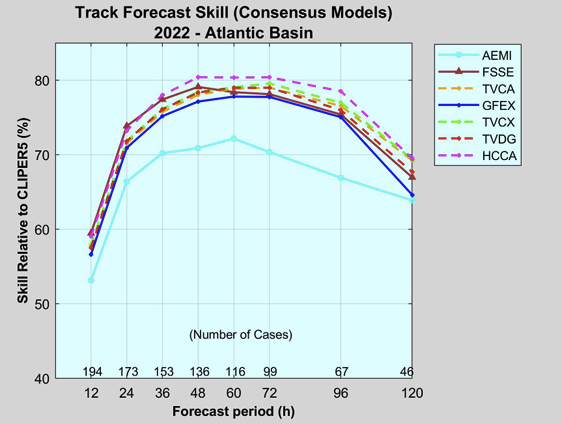HCCA
The HFIP Corrected Consensus Approach to Forecast Hurricanes
The HFIP Corrected Consensus Approach (HCCA) for tropical cyclone track and intensity forecasts has been a mainstay model at the National Hurricane Center since 2015. HCCA has been shown to be one of the more skillful models for both track and intensity in both the Atlantic and East Pacific basins.
HCCA applies unequal weights to input forecast models based on the performance of individual models over a set of training forecasts. The HCCA model takes into account the strengths and weaknesses of individual models and corrects biases in their predictions. By doing so, it leverages the collective knowledge from multiple models to enhance the accuracy of hurricane track and intensity forecasts.
During my time at the National Hurricane Center, I took over the development of HCCA. My work included rewriting the model into Python and transitioning it to the operational guidance suite. I also lead the updates to the training dataset and performed rigorous testing of new forecast models to incorporate into the consensus.

For more details about how HCCA works and its performance see the cited documents below or send me an email.
Cangiolosi, J., 2023: National Hurricane Center Forecast Verification Report: 2022 Hurricane Season, https://www.nhc.noaa.gov/verification/pdfs/Verification_2022.pdf
Simon, A., A. B. Penny, M. DeMaria, J. L. Franklin, R. J. Pasch, E. N. Rappaport, and D. A. Zelinsky, 2018: A Description of the Real-Time HFIP Corrected Consensus Approach (HCCA) for Tropical Cyclone Track and Intensity Guidance. Wea. Forecasting, 33, 37–57, https://doi.org/10.1175/WAF-D-17-0068.1.